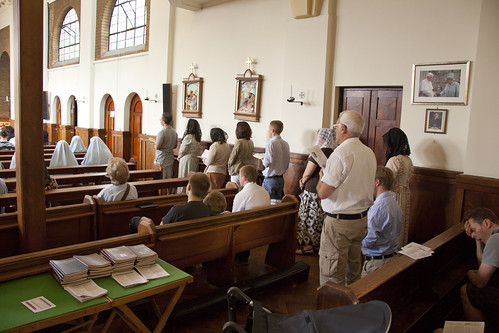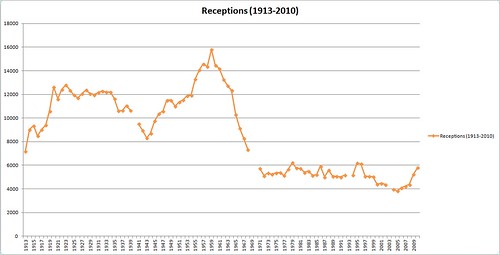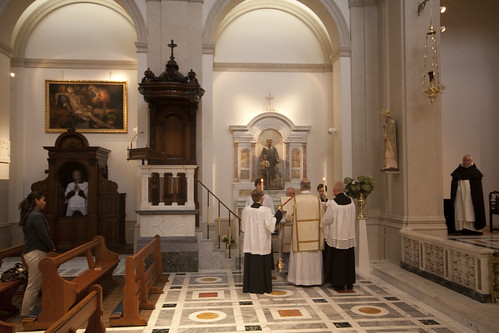 |
| The queue for the confessional during Sunday EF Mass at St Bede's, Clapham Park, London |
So today, entering into the spirit of Francis' call for everyone to return to the practice of individual confession and absolution, I want to suggest that there is one rite of this sacrament, that of general absolution without individual confession, which in the years immediately after the Second Vatican Council proved its efficacy in this respect.
So he is rejecting the Holy Father's call for individual confession and absolution, at least in the first instance. He claims, however,
What happened after the Council was that thousands of people who had been away from the sacrament for scores of years and needed to return, came to Lent and Advent celebrations of general absolution without confession, experienced God's love and mercy, and thereafter regularly frequented the conventional individual confessions [sic].
...
The third option, that of the intermediate rite of individual confessions and absolutions within the framework of of a communal celebration of forgiveness [presumably 'penance services' are in view here], can go so far in reaching out to people. The community is gathered together. But experience has shown it does not go far enough. Otherwise we would not be in the situation where we now find ourselves.
...
Sadly, he claims, Bishops 'are so hedged in by petty bureaucratic rules that in practice they cannot' allow general absolution to meet this need.'
Yet to judge from past experience immediately after the Council this is exactly what is so effective not only in bringing people together for the liturgical celebration of general absolution without individual confession, but through the grace-filled joy of such an occasion, of successfully tempting back many of them to more conventional individual confession during the year.
Get that: 'during the year'. This is important.
 |
| The effectiveness of all the exciting abuses after the Council, reflected in the number of conversions. |
It is far from clear what Loftus thinks people should confess: perhaps this is part of the attraction for him of general absolution. Having given a pretty accurate account of Natural and Positive Law, he remarks:
...this law-centered approach to sin... pays scant or no respect to the fact that love is a relationship. ...Grace is what moves towards God. Sin is what moves us away from him. So we need to ask for forgiveness.
First of all, I ask, not for the first time, where is the outrage about this? Where are the conservative Catholic bloggers talking about this scandalous article, in a newspaper sold with ecclesiastical approval in our churches? Where are all those people so eager to find the mote in the eye of the traditional Catholic movement, who seize on the lightest word in a blog com box or what they once heard after a Traditional Mass from some one or other, to prove that trads are all disloyal or reject the Council or whatever? Why are they so disinclined to see the beam in the eye of the mainstream Church? Doesn't it occur to them that the scandal of this kind of article appearing, let me say it again in a newspaper with ecclesiastical approval, bearing the name 'Catholic' in its title and sold in churches, doesn't it occur to those 'conservative' Catholics that this kind of thing keeps tens of thousands of Catholics away from canonically regular Masses and priests? That they, by remaining silent, by tolerating this, are themselves accessories to what they are pleased to call the sinful schismatic mentality of vast numbers of their fellow Catholics?
Can someone please let me know when any of the great conservative Catholic writers picks up a pen to point out the scandal being caused every single week by articles like this appearing in supposedly Catholic newspapers? I have never seen them do so, not once. It has been left to marginal people, nearly always people tainted by liking the Traditional Mass, like me, Daphne McLeod, Fr Thomas Crean OP and Fr Armand de Malleray FSSP, to write in protesting letters and mention it on blogs. This, frankly, is a bigger scandal than the publishing of the article in the first place.
Ok, rant over, what exactly is wrong with what the great Monsignor is pleased to deliver to us this pleasant weekend? The central problem is that what he proposes would not be sacramentally valid, something he is strangely reluctant to mention. He claims, as usual, that the restrictions on general absolution are just 'petty rules', but they are rules for the good of souls to ensure the validity of the sacraments, and not just their worthy celebration.
General absolution is only valid if the penitent has the intention of going to individual confession as soon as possible.
Loftus goes out of his way to demonstrate his intellectual dishonesty in this piece. He quotes (with the number) the Catechism of the Catholic Church articles 1484 and 1487, but lets slip no hint of the contents of article 1483, which says what I have just highlighted, and of which he cannot possibly be ignorant. I include it in full as an appendix below.
The purpose of the General Absolution is to deal with situations in which individual confession is impossible, such as soldiers before a battle. The survivors must get themselves to individual confession afterwards, when they can. This is a far cry from the pious hope Loftus expresses that people who've been to a General Absolution service will go again 'during the year'. That makes it crystal clear that it is no part of Loftus' proposal that penitents even be made aware of the conditions for validity of the sacrament they are receiving, and even if they do go to individual confession later they will not realise that they must confess the sins for which they were given general absolution.
Bear in mind that Loftus has in mind especially people who have been away from the sacraments for 'scores of years'. We are talking about people with mortal sins to confess.
This is why pushing General Absolution is so deeply worrying. People go in good faith, they are told that it is sacramentally valid, but in practice they do not fulfill the conditions of validity - because they are not told what they are - and so they will not receive sacramental absolution. They are not told because to tell them would reveal the pointlessness of the whole exercise in the pastoral situation envisaged, where there is no real emergency. The whole sacrilegious charade has been condemned repeatedly, not only by Rome but by our own bishops such as Bishop Crispian Hollis.
God is not bound by the Sacraments, the old saw has it, but we are. Loftus' proposal is to have people dying with mortal sins on their souls which they believe have been sacramentally absolved. I choose my words with care when I say: this is diabolical.
 |
| Fr Ray Blake in the rather grand confessional of St Patrick's Soho Square during a Mass for Juventutem London. |
--------
The Catechism on General Absolution.
1483 In case of grave necessity recourse may be had to a communal celebration of reconciliation with general confession and general absolution. Grave necessity of this sort can arise when there is imminent danger of death without sufficient time for the priest or priests to hear each penitent's confession. Grave necessity can also exist when, given the number of penitents, there are not enough confessors to hear individual confessions properly in a reasonable time, so that the penitents through no fault of their own would be deprived of sacramental grace or Holy Communion for a long time. In this case, for the absolution to be valid the faithful must have the intention of individually confessing their grave sins in the time required. The diocesan bishop is the judge of whether or not the conditions required for general absolution exist. A large gathering of the faithful on the occasion of major feasts or pilgrimages does not constitute a case of grave necessity.
Nb also the Code of Canon Law, Canons 960-963, especially:
Can. 962 §1. For a member of the Christian faithful validly to receive sacramental absolution given to many at one time, it is required not only that the person is properly disposed but also at the same time intends to confess within a suitable period of time each grave sin which at the present time cannot be so confessed.
§2. Insofar as it can be done even on the occasion of the reception of general absolution, the Christian faithful are to be instructed about the requirements of the norm of §1. An exhortation that each person take care to make an act of contrition is to precede general absolution even in the case of danger of death, if there is time.
And see also Blessed Pope John Paul II's Apostolic Letter Misericordia Dei of 2002.
Given that the so-called 'Bishop of Bling' has been taken to one side, we should pray that the 'Monsignor of Mendacity' is dealt with in a similar fashion.
ReplyDeleteI'm indebted to Mgr Loftus for explaining why my parish priest is so keen on penitential services with general absolution - they became popular in the years 'immediately after Vatican II'. So did folk masses and we still have to endure those. The same priest also, oddly, wonders why so few people go to confession- well, why would they if they can go along twice a year and be 'absolved' without the embarrassment of having to confess? I gather from parishioners of longer standing than myself that the bishop is aware of the practice and 'winks at it'.
ReplyDeleteGeneral absolution is a gift for priests who'd rather be off and away rather than spending a Saturday sitting in a stuffy confessional listening to the same old, same old. I wonder if they ever go to personal confession.
ReplyDeleteI really don't understand why The Catholic Times allows him a mouth piece?
ReplyDeleteHe is a relic of the 1970's post conciliar era of pick and mix Spirit of Vatican II'sim.
His theology and adherence to the teachings of Holy Mother the Church are as shaky as a set on another 1970's throw back, Crossroads!
"What happened after the Council was that thousands of people who had been away from the sacrament for scores of years and needed to return, came to Lent and Advent celebrations of general absolution without confession, experienced God's love and mercy, and thereafter regularly frequented the conventional individual confessions."
ReplyDeleteAnd does Msgr Loftus offer ANY documented proof for this remarkable assertion?
Another excellent article Joe. Now I am beginning to understand why you devote time to the Monsignor, whose agenda becomes clearer as time goes on.
ReplyDeleteWhat on earth persuades him to act as he does ?
Keep up the outstanding work, If only more priests would preach like this from the pulpit.
Though I am sure that I am not to be numbered among the worthy conservative bloggers you reasonably call to account for failing to take arms against Loftustantism, there may be reasons why some have not given Mr Loftus' article the savaging it deserves.
ReplyDeleteFor my own part I can excuse myself by saying that we do not get the Catholic Times. All I know of it comes through your excellent fisking of Loftustant articles.
O felix culpa.
We cancelled our long standing CT subscription some years ago in part because of Basil Loftus. My latest letter to the Herald r.e. One Bread one Body document, went unpublished.
ReplyDeleteI'm not so sure that someone invalidly receives a general absolution when he - for lack of knowledge - does not go to individual confession later.
ReplyDeleteThis is because of Can. 144 §1.: "In factual or legal common error and in positive and probable doubt of law or of fact, the Church supplies executive power of governance for both the external and internal forum."
This boils down to: "If your dumb but not evil, that's okay."
As long as the external form of the sacrament is being upheld - to the best of the recipient's knowledge - he can trust that the sacrament will work.
There are some caveats: An impostor hiding in a confessional cannot absolve sins even if the penitent believes he is a priest. That's because a material condition of the sacrament wasn't in place, not merely a legal one.
But the obligation to go to individual confession seems to be covered by this canon. So I don't think souls are being lost because of this.
It isn't whether they *do* go to individual confession afterwards, it is whether they *intend, at the time*, to go when they can. I don't think this is a merely legal requirement, it is an adjunct to the contrition necessary for the validity of the sacrament.
DeleteYou are of course correct as to the intention, not the act of individual confession being the condition for absolution. However, I am unsure about the status of this condition. I do think an unknowledgeable penitent would be covered by Can. 144 § 1. At least it's up for discussion. The priest giving general absolution without instruction is irresponsible, that's for sure.
DeleteCertainly Canon law makes telling the penitent about it an explicit obligation, as I quote at the end of the post. I am seeking the advice of a canonist however to clarify, and will update the post when I get more information. It is an interesting (and important) question. Thanks for raising it.
Delete